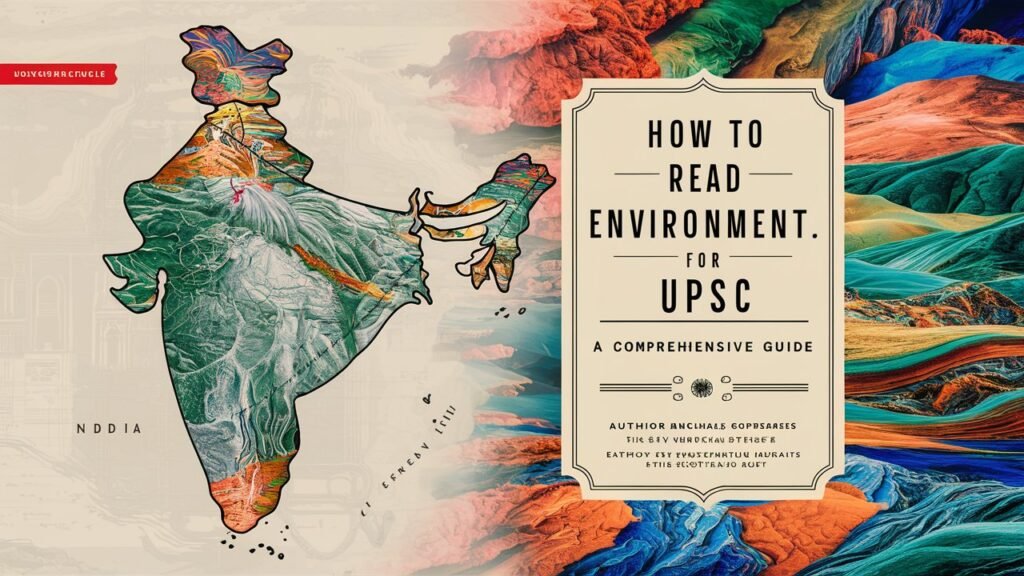
For aspirants preparing for the UPSC examination, staying informed about current affairs and understanding the environment is crucial. The UPSC syllabus includes a significant portion dedicated to environmental issues, and a thorough understanding of this subject can greatly enhance your chances of success. In this guide, we’ll delve into effective strategies on how to read environment for UPSC and equip you with the necessary tools to excel in this aspect of the examination.
Understanding the Importance of Environmental Studies in UPSC
Before diving into specific strategies, let’s first grasp why environmental studies are integral to the UPSC examination. The UPSC syllabus encompasses a wide array of topics, ranging from history and geography to politics and economics. Among these, environmental studies hold significant weightage due to several reasons.
Firstly, environmental issues are increasingly becoming a global concern, with issues such as climate change, biodiversity loss, and pollution garnering widespread attention. As future civil servants, UPSC aspirants must possess a sound understanding of these challenges and be equipped to formulate policies and solutions to address them effectively.
Secondly, environmental issues are intricately linked with other aspects of the UPSC syllabus, such as geography, science and technology, and current affairs. A comprehensive understanding of environmental studies can thus help aspirants integrate knowledge from various subjects, enabling a holistic approach to tackling questions in the examination.
Strategies for Reading Environment for UPSC
Now that we’ve established the importance of environmental studies in the UPSC examination, let’s explore effective strategies on how to approach this subject:
- Stay Updated with Current Affairs: Reading environment for UPSC necessitates staying abreast of current environmental developments. Make it a habit to read newspapers, magazines, and reputable online sources for the latest news and updates on environmental issues. Websites like Prepare4UPSC provide comprehensive resources to help you stay informed.
- Refer to Standard Textbooks and Resources: While staying updated with current affairs is crucial, it’s equally important to have a solid foundation in environmental concepts. Refer to standard textbooks such as “Environment by Shankar IAS” and “Principles of Environmental Science and Engineering” by P. Venugopala Rao for in-depth understanding.
- Understand Environmental Concepts: Familiarize yourself with key environmental concepts such as climate change, biodiversity conservation, environmental laws and policies, sustainable development, and natural resource management. Ensure that you understand the underlying principles and their implications thoroughly.
- Analyze Environmental Reports and Indices: Pay attention to environmental reports and indices released by organizations like the United Nations Environment Programme (UNEP), World Wildlife Fund (WWF), and Intergovernmental Panel on Climate Change (IPCC). Analyzing these reports can provide valuable insights into global environmental trends and challenges.
- Practice Answer Writing: Practice writing answers to previous years’ UPSC questions related to environmental studies. Focus on structuring your answers effectively, incorporating relevant facts and examples, and presenting a balanced viewpoint.
Comparison Table:
| Strategy | Description |
|---|---|
| Stay Updated with Current Affairs | Regularly read newspapers, magazines, and online sources for the latest environmental news and updates. |
| Refer to Standard Textbooks | Consult standard textbooks such as “Environment by Shankar IAS” and “Principles of Environmental Science and Engineering” for in-depth understanding of environmental concepts. |
| Understand Environmental Concepts | Familiarize yourself with key concepts such as climate change, biodiversity conservation, and sustainable development, ensuring a thorough understanding of their implications. |
| Analyze Environmental Reports | Pay attention to environmental reports and indices released by reputable organizations to gain insights into global environmental trends and challenges. |
| Practice Answer Writing | Practice writing answers to previous years’ UPSC questions related to environmental studies, focusing on effective structuring and incorporation of relevant facts and examples. |
Conclusion
In conclusion, reading environment for UPSC requires a multi-faceted approach encompassing staying updated with current affairs, referring to standard textbooks, understanding key environmental concepts, analyzing environmental reports, and practicing answer writing. By adopting these strategies and integrating them into your preparation regimen, you can enhance your proficiency in this crucial aspect of the UPSC examination.
Remember, success in the UPSC examination is not just about acquiring knowledge but also about applying it effectively. By mastering the art of reading environment for UPSC, you’ll not only enhance your chances of clearing the examination but also contribute meaningfully towards addressing pressing environmental challenges facing our planet.
Read Also:
- Your Ultimate Guide to Staying Informed: Current Affairs 2024
- Important News for UPSC Aspirants: Indian Express Today
Incorporating these resources into your preparation can provide valuable insights and further enrich your understanding of environmental studies for the UPSC examination.

